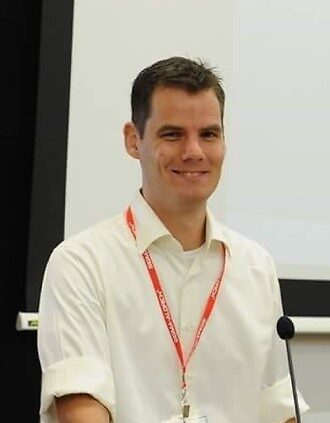Seminar "Metal-Metal and Metal-Ligand Cooperation for Activating Small Molecules: Unprecedented Rate Acceleration for Oxygen Atom Transfer" by Dr. Graham de Ruiter, Technion - Israel Institute of Technology

Date
Location
Description
Title: “Metal-Metal and Metal-Ligand Cooperation for Activating Small Molecules: Unprecedented Rate Acceleration for Oxygen Atom Transfer”
Speaker: Dr. Graham de Ruiter, Assistant professor, the Schulich Faculty of Chemistry, Technion - Israel Institute of Technology
Abstract:
The versatility by which iron-containing metalloenzymes are able to activate and oxygenate C–H bonds with molecular oxygen has sparked much interest in the underlying mechanism. It has been shown that high-valent iron metal centers bearing terminal metal-oxo motifs are commonly invoked in the oxygenation step, and their formation has been studied in many monometallic iron model complexes. Despite the intense research efforts, terminal metal-oxo motifs on multi-metallic scaffolds are rare. Recently, we presented a new class of tetra-iron complexes that are site differentiated. In these complexes, three six-coordinate iron centers form a trimetallic “core” that is connected to a fourth unique coordinatively unsaturated apical iron center. We have also shown that treating – for example – [LFe3(PhPz) 3OFe] [OTf] 2(PhPz = Ph pyrazolate) with oxygen-atom transfer reagents (e.g. Iodosobenzene or TBAIO4) results in regioselective intramolecular hydroxylation of an arene C–H bond. These reactivity patterns suggest the involvement of a rare FeIV-oxo motif on well-defined multi-metallic scaffold. Here we show that the selectivity and reactivity of the different metal clusters can be modulated by regulating the oxidation state of the trimetallic “core” resulting in intramolecular electron transfer pathways that are able to alter the reactivity of terminal iron-oxo species (e.g. MIV-O vs. MIII-O), and unprecedented rate acceleration in oxygen atom transfer reactions.
Dr. Graham de Ruiter
Dr. de Ruiter attended Leiden University for his undergraduate studies where he received both his Bachelor (B.Sc.) and Master (M.Sc.) degree (cum laude) under the supervision of Prof. Jan Reedijk. In 2008, Graham moved to the Weizmann Institute Science to pursue his Ph.D. studies with Prof. Milko E. van der Boom, working on sequence dependent assembly strategies and molecular logic. After obtaining his Ph.D., Graham moved to the California Institute of Technology to perform post-doctoral research with Prof. Theodor Agapie working on the synthesis of multi-metallic complexes for small molecule activation and oxygen atom transfer reactions. During his studies, Graham has received the Israel Chemical Society (ICS) Award for excellent graduate student (2011), the International Precious Metal Institute (IPMI) Sabin Metal Corporation Student Award (2013), the Feinberg Graduate School (FGS) Dimitris N. Chorafas Prize (2013), and the Azrieli Fellowship (2017). Graham returned to Israel in 2017 to start his independent career at the Technion - Israel Institute of Technology (Haifa), where he is an assistant professor in the Schulich Faculty of Chemistry and a a Horev Fellow supported by the The Henry and Marilyn Taub Foundation in the Leaders in Science and Technology Faculty Recruitment Program. His research focusses on using inorganic materials to address fundamental challenges related to solar energy conversion and small molecule activation in order to provide clean and cost-effective methods for maintaining a sustainable energy landscape.
Intra-Group Category
Subscribe to the OIST Calendar: Right-click to download, then open in your calendar application.



